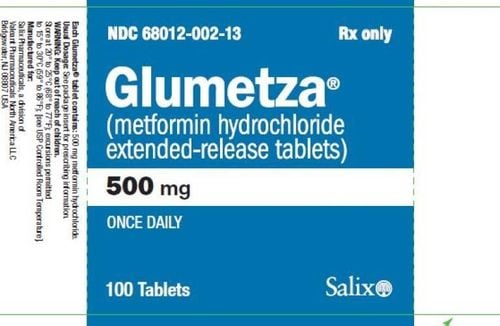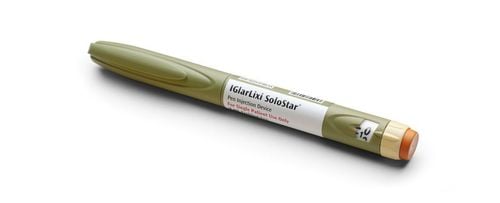This is an automatically translated article.
Bivicarbo is a drug indicated in the treatment of diabetes. For the drug to work best, the patient must follow the instructions of the doctor or pharmacist. Here are some important information related to the drug that users cannot ignore.
1. What is the effect of Bivicarbo?
Bivicarbo medicine contains the active ingredient Acarbose 50mg. This active ingredient is known as pseudo tetrasaccharide, an inhibitor of pancreatic alpha-glucosidase and alpha-amylase, with effective anti-hyperglycemic activity. Accordingly, the mechanism of action of Acarbose is to bind and inhibit alpha-glucosidase, hydrolyze oligosaccharides and disaccharides into Glucose as well as some other monosaccharides. This will contribute to effectively preventing the breakdown of larger carbohydrates into glucose. Especially reduces the rise in blood sugar levels after eating.
In addition, another effect of the active ingredient Acarbose that we cannot fail to mention is the ability to inhibit the pancreatic alpha-amylase enzyme from hydrolysing complex starches into oligosaccharides in the small intestine. With the above effects, Bivicarbo drugs are commonly used in the control of type 2 diabetes.
2. Indications and contraindications to the drug Bivicarbo
2.1. Indications Bivicarbo is indicated for use in the following cases:
Used as a monotherapy in people with type II diabetes when diet and exercise are not effective. Use of a sulfonylurea combination in the treatment of type II diabetic patients whose hyperglycemia is not controlled by bivicarbo or sulfonylurea monotherapy. 2.2. Contraindications Do not use Bivicarbo in the following cases:
People with a history of allergy to the active ingredient Acarbose or any ingredient of Bivicarbo. People with intestinal infections when they have ulcers, hernias, low blood sugar. Patients with liver failure, severe renal failure, diabetic ketoacidosis, pregnant or lactating women.
3. Side effects of Bivicarbo
The undesirable effects that may be encountered when using Bivicarbo include:
Affects the digestive system causing abdominal pain, bloating, diarrhea, flatulence, indigestion. Causes itchy skin, erythema, jaundice, hepatitis , sometimes appear edema. During the use of Bivicarbo, if you see any unwanted effects, the patient should immediately notify the doctor for timely handling.
4. Bivicarbo drug interactions
Using Bivicarbo with enteric adsorbents or preparations containing digestive enzymes will reduce the effect of Bivicarbo. Bivicarbo interacts with Cholestyramine and increases the effect of Bivicarbo, significantly reducing postprandial insulin. Concomitant use with Neomycin may increase side effects on the gastrointestinal tract. Do not use cane sugar or sugar-containing products when taking Bivicarbo, because it will lead to stomach upset and diarrhea. Concomitant use with Digoxin will affect the bioavailability of Digoxin. To avoid drug interactions, you need to inform your doctor about the drugs and supplements you are taking before taking Bivicarbo.
5. Be careful when using Bivicarbo
Before using the medicine, the patient should check the expiry date, if the medicine has expired, do not take it. When using Bivicarbo, it is necessary to periodically check liver function because this can be the cause of liver enzyme disorders affecting the normal physiological function of the liver. Care should be taken when combining Bivicarbo with antidiabetic drugs to avoid the risk of causing excessive hypoglycemia that will affect health. If you take an overdose of Bivicarbo, there is an increased risk of side effects such as bloating, diarrhea, and abdominal discomfort. At this time, the patient should pay attention not to eat carbohydrates for 4 to 6 hours and contact the doctor for timely handling. Above is some basic information about Bivicarbo drug. Patients can consult to understand more about this drug before using it.













